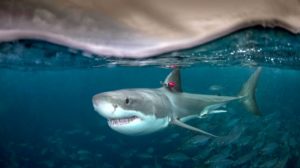
Shark ecologist Dr Charlie Huveneers will launch a new research project into the ‘secret lives’ of South Australia’s white sharks after achieving the $20,400 crowdfunding target.
Dr Huveneers will use the generous donations for one of the most detailed studies of the State’s white sharks.
The leader of the Southern Shark Ecology Group, Dr Huveneers is specifically looking at white shark predatory strategies and whether shark cage-diving affects the behaviour of sharks at South Australia’s Neptune Islands, the only location where white shark cage-diving takes place in Australia.
He will use novel state-of-the-art ‘activity packages’ to record up to seven days of the behaviour of free-swimming sharks. The packages have the ability to record swim speed, depth, and acceleration (such as during bursts of speed). These are recorded at an extremely high frequency, with about 30 observations recorded every second, leading to over 2 million records in 24 hours.
The activity packages, which are painlessly attached to the shark’s dorsal fin, detach themselves after a few days, minimising their impact on the animals.
Crowdfunding supporters will share videos and A3-size poster prints of sharks, with one supporter getting the opportunity to join Dr Huveneers for a three-day trip to the Neptune Islands.
This is possible thanks to the support of shark cage-diving operators who facilitate Dr Huveneers’ research by allowing him to travel with them to the Neptune Islands.
“Recent research has shown that the residency and fine-scale swimming behaviour of white shark can be affected by cage-diving tourism,” Dr Huveneers says.
“This new research project is an incredibly unusual opportunity to discover if those changes are positive, neutral, or negative at an individual or population level for sharks.
“We will record the activity of white sharks and determine their predatory/feeding strategy at the Neptune Islands, compare the activity of white sharks when cage-diving operators are present and absent, and assess any changes observed.
“Our activity package includes a video camera that will film similar videos to those created by world-class media organisations like National Geographic.
“This will allow us to record the activity and movement of the sharks in relation to their behaviour as shown by the footage taken from the shark’s perspective.
“Thanks to this equipment, we will better understand the predatory behaviour of white sharks and how they hunt seals or fish while at the Neptune Islands, and how the shark activity relates to the cage-diving industry” Dr Huveneers says.
‘The Secret Lives of Sharks’ project is outlined here. For more information about Flinders University crowdfunded research, click here.

